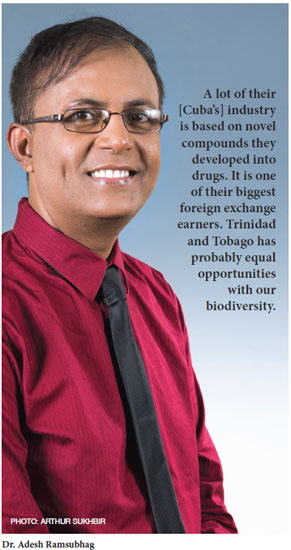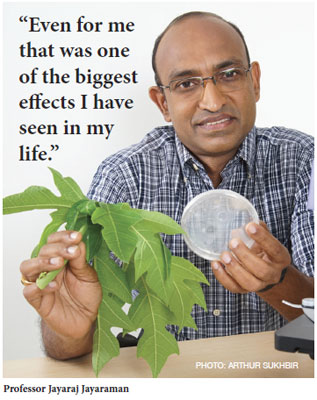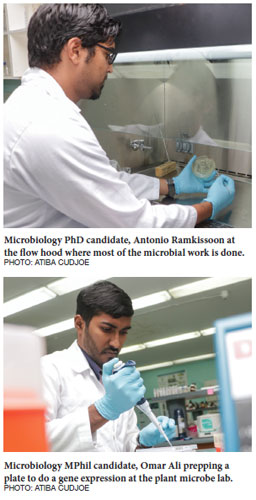
 Oil and gas, cocoa, scorpion peppers – Trinidad has always been blessed with abundant, unique and profitable natural resources. Researchers at UWI St. Augustine's Faculty of Science and Technology have found another, one with the potential to form the basis of a robust, export-driven industry. Yet the resource is invisible to the naked eye – microorganisms. Oil and gas, cocoa, scorpion peppers – Trinidad has always been blessed with abundant, unique and profitable natural resources. Researchers at UWI St. Augustine's Faculty of Science and Technology have found another, one with the potential to form the basis of a robust, export-driven industry. Yet the resource is invisible to the naked eye – microorganisms.
Why are these tiny organisms so potentially valuable? Because the processes they create have antibiotic as well as other properties. In other words, researching microorganisms can lead to the development of pharmaceuticals, an industry whose world market revenue is estimated at over US$1 trillion. And in the case of Trinidad, UWI scientists have found several sites with microbial activity well above the norm.
“We have some tremendously exciting hot spots in Trinidad. The diversity is enormous,” says Dr. Adesh Ramsubhag, Senior Lecturer in Microbiology and Head of the Department of Life Sciences. “We collaborate with some of the world leaders in genomics and metagenomics. They carried out a project where they collected samples from oceans around the world twice. The microbial diversity results were not comparable to these Trinidad hot spots.”
“We are trying to show proof of concept. And we are very close. We have discovered a novel antibiotic and we have at least two others that are potentially novel. I believe this can be one of our greatest economic resources,” he says.
But like any resource, it will require sustainable investment. So far the discoveries and the hard work behind them have been driven by researchers within the Faculty, including several students. Furthering this work will require resources in equipment and manpower. It will also require intellectual property protection. Biotechnology (products from biological sources) is a dynamic and competitive business, if Trinidad and Tobago does not see the value of its bio-resources, invest in them and protect them, others will. They may be doing so already.
Under a microscope
“Every year I give my students a few projects in microbiology,” Dr. Ramsubhag says. “I give them to explore indigenous microorganisms from different environments to see those that might be producing antibiotics. One day this group came excitedly knocking on my office door.”
The students had struck gold. They had discovered a microorganism with phenomenal antibiotic properties. A small amount eliminated a dish full of bacteria. They conducted the experiment several times and the result was the same. One of the Life Sciences students, Antonio Ramkissoon, is continuing the research as his thesis, in collaboration with the Department of Chemistry.
“Even for me that was one of the biggest effects I have seen in my life,” says Professor Jayaraj Jayaraman. A professor of biotechnology and plant microbiology, Jayaraman has been a faculty member at universities in India, Canada and the USA.
In the microscopic world, the rule of survival of the fittest applies. Organisms are in competition, and the more diversity of organisms, the greater the competition. The greater the competition, the greater likelihood of organisms having distinct and powerful antibiotic effects to eliminate rivals.
The enormous diversity in the Trinidad hot spots leads to organisms like the one discovered by Antonio and its novel antibiotic compounds can potentially be developed into a drug. And because many pathogens have developed a resistance to existing antibiotics because of their overuse, drugs developed from novel compounds can be both highly beneficial to human health and highly profitable.
You don't have to look far for an example of just such a process of profitable natural products. From 2013 to 2017, the biotechnology industry of Cuba was expected to earn US$5 billion. In the previous five-year period, it brought in US$2.5 billion. The Cuban biotech industry is a major producer and exporter of pharmaceuticals and could be even larger were it not for the longstanding embargo against the Caribbean nation. In recent years Cuba has developed innovative natural products such as Heberprot-P, which is used in the treatment of diabetic foot ulcers; CimaVax-EGT, a lung cancer vaccine for patients in the advanced stage; and Theraloc, an antibiotic for the treatment of lung and gastric cancer.
“Cuba is a best model,” says Professor Jayaraman, “whatever industry they have is home grown.”
Dr. Ramsubhag agrees, “they have invested tremendously for decades in biotechnology (almost US$1 billion in the late 1980s). A lot of their industry is based on novel compounds they developed into drugs. It is one of their biggest foreign exchange earners. Trinidad and Tobago has probably equal opportunities or more with our biodiversity.”
 A research culture A research culture
Antonio's novel compound discovery is one of several natural product-based research activities taking place at the Faculty of Science and Technology. Another PhD student, Tresha Dobson, from the Chemistry Department has isolated several novel compounds, some of which have antibiotic effects. One in particular has been found to have effects very similar to a drug used in the treatment of Parkinson's Disease.
“We need to invest in this kind of research,” Ramsubhag says of the high potential of these biological compounds.
Another graduate student in the Life Sciences Department, Omar Ali, is conducting very promising research into the effects of Trinidad's seaweed on specific agricultural crops. In addition to his microorganism research, Antonio was also involved in the seaweed project and is currently working on what has the potential to be groundbreaking work on a natural anti-mosquito product. Many such projects are going on in partnership with the Chemistry Dept.
An important aspect of this research is that it is driven by students. In the words of the Department, Life Sciences is the “direct descendent” of the Imperial College of Tropical Agriculture, the research institution founded in 1922 that would become the UWI St. Augustine Campus. Although UWI has expanded its role to teaching, departments such as Life Sciences place major emphasis on facilitating a research culture and empowering students with an interest and capacity for original and impactful scientific inquiry.
“All it requires is a spark,” Professor Jayaraman says, speaking about unlocking the research potential in students. “We give them enough opportunities to pick up threads. We don’t hand-hold them. That is not research. We teach them the procedures and then we let them go, providing guidance and suggestions. That freedom is very important. If you have freedom the mind will be liberated, clear and they will think on their own.”
Dr. Ramsubhag says the good researchers are not always the ones who get the highest grades. He points to attributes like self-motivation, capacity for hard work and good observational skills.
“You need to have a thirst for knowledge and exploring new ideas,” he says, pointing out that these attributes can be unlocked in students once they are exposed to new ideas and scenarios. Because of its international relationships, the Life Sciences Department allows students to collaborate with some of the top experts in the field and use the latest technology.
Investing in T&T's biotechnology future
The gains made by UWI scientists in biotechnology are impressive but much more can be achieved with sustainable funding. Through mechanisms like the Research and Development Impact (RDI) Fund, UWI St. Augustine strives to support research with a strong potential for the development of the region, but its resources are limited. Likewise there is enormous competition for international research funding.
Faculty members like Dr. Ramsubhag and Professor Jayaraman and student researchers invest their time and in some cases their own money to further research that can bring massive dividends to Trinidad and Tobago. But they can only do so much.
“We need significant investment in our laboratory infrastructure,” says Dr. Ramsubhag. “But more importantly we need grant funding to hire dedicated human resources. This is necessary for isolation and downstream processing. We need post-doctoral scientists to do the full spectrum from discovery to development.”
With these resources in place, he says The UWI can take a potential drug up to laboratory trials and animal models. The next step will be working with the international pharmaceutical companies, relationships that the Faculty of Science and Technology is currently building.
Professor Jayaraman points again to the Cuban model, in which the Government made substantial investments in biotechnology and the nation is now reaping the reward.
“This kind of research leading to product development is strategic and it deserves local support. We do not wish to seek outside support for these kinds of projects because of the sensitivity of the research and the intellectual rights,” he says.
In the World Economic Forum's “Global Competitiveness Index,” innovation remains a consistent drag on the nation's competitiveness and its investment and in research and development ranks close to the bottom of the 140 economies ranked.
“We need to change the perception of society when it comes to research,” Jayaraman says. “We must have a vision. We are sitting on a treasure which is a big, sustainable resource and we have to use it to sustain our economy.”
 Molecule men Molecule men
“Nature provides a lot of the resources we need,” says Antonio Ramkissoon, giving a brief but complete statement on the value of natural products. A PhD student in microbiology, Antonio is one of a new generation of young researchers in the Faculty of Science and Technology exploring the potential of biological-based products for medical treatment and commercialisation.
Working in the Life Sciences Department, he is involved in several projects. His thesis focuses on the development of antibiotic drugs from microorganisms. He has successfully identified several novel or potential compounds with antibiotic effects and is currently working on measuring their safety for human use and tweaking the strength of effect. Antonio is also working on a plant-based product that repels mosquitoes and kills larvae. This is very promising research.
A third project he has worked on is the anti-fungal effects of certain types of seaweed on specific crops. This research has been continued by another young microbiology researcher at Life Sciences, Omar Ali.
“Utilising two local seaweeds we have extracted a liquid and applied it to tomatoes and bell peppers,” Omar explains.
The results have been dramatic. Not only did the seaweed cause a major reduction in disease, it also increased the growth of the plants and their yields. Currently Omar is doing molecular analyses to determine the interactions taking place at the gene expression levels to help explain the mechanisms of action of these extracts.
For both Antonio and Omar the ultimate ambition is to see their research lead to the development of natural products – medicines, pesticides, insect repellants. Under the guidance of their supervisors and researchers, they are pioneers in what could, with the appropriate strategy and investment become, a Trinidad and Tobago-based biotechnology industry. They are doing their part.
Joel Henry is a writer and editor. |





